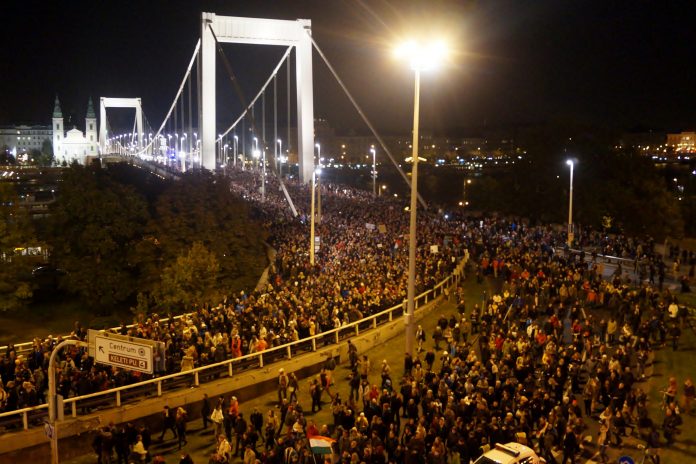The EU should amplify the voice of those standing up for rights and freedoms and involve them more closely in its work to safeguard the rule of law.
The European Economic and Social Committee (EESC) has called on the EU to adopt a more comprehensive and proactive approach to tackling the rise in breaches of the rule of law across the Union, amid concerns that they could escalate to a full-blown crisis in democracy and fundamental rights and freedoms.
In a recent opinion, the EESC asked for civil society organisations to be involved more effectively and directly in devising and implementing safeguards against the crumbling of the rule of law in the EU. Many of these organisations raise awareness, act as watchdogs or advocates, and as such are often the first to suffer at the hands of authoritarian governments.
As the EU body giving voice to all components of civil society, “the EESC has a special role to play and a duty to act when activities of its own members and civil society at large are at risk within the EU,” it said in the opinion.
The EESC therefore called for better protection for civil society organisations, alongside other key public watchdogs like journalists, whistle-blowers and human rights defenders, which is a prerequisite for any lasting way forward as their role is paramount for safeguarding democracy in Europe.
To support the activities of these key actors in the area of awareness-raising, monitoring and documentation, advocacy and litigation regarding fundamental rights and the rule of law, it also asked for the next Multiannual Financial Framework to provide more core funding.
The opinion is the EESC’s input to the reflection process on further strengthening the rule of law within the Union, proposed by the European Commission in a recent communication in which it invited all stakeholders to contribute to the debate. The EESC opinion was drafted by three rapporteurs from the Committee’s three groups: employers, workers and organisations representing various interests.
The EESC said it welcomed the Commission’s efforts to use the available instruments to strengthen the rule of law in the Member States, although it noted their shortcomings in preventing or correcting concerted attacks on fundamental rights and freedoms.
Commenting on value-related infringement proceedings, recently launched against several Member States, it said that these instruments should be used whenever possible, but are not enough in themselves as not all violations pertain to EU law.
“We need much more convincing action on the part of the EU as the situation is more than concerning. How is it possible that in 2019 we have EU countries violating the rule of law? Things have gone too far,” said José Antonio Moreno Díaz, rapporteur for the EESC’s Workers’ Group.
“The weakening of the rule of law is subtle; it does not happen overnight. However, if you look at the situation in the long term, you can see that some freedoms have already been infringed. And civil society organisations are likely to be first in line when authoritarian forces hold sway in any EU country,” said Katarina Dreszer-Smalec, rapporteur for the Diversity Group.
The EESC also regretted that the reflection process launched by the Commission had not been longer, enabling civil society to be consulted and take part in a more detailed way.
To improve the EU rule of law toolbox, the EESC called for a systematic and comprehensive mechanism giving a strong role to civil society.
This mechanism would involve all EU institutions and all relevant stakeholders in monitoring and discussing respect for fundamental rights and the rule of law in the EU. The EESC would have a particular role to play in the preventive phase of the mechanism, enabling grassroots organisations to trigger an early warning about possible emerging threats to the core EU values in Member States.
With a view to formalising this preventive phase, the EESC proposed establishing an annual EU stakeholders forum on fundamental rights and the rule of law, which the EESC could co-organise with the European Commission. This forum would give EU actors early warning of emerging challenges directly from the ground and would foster dialogue among all stakeholders, including the social partners and authorities.
The EESC also proposed that the future vice-president of the European Commission responsible for fundamental rights should be tasked with overseeing an enabling environment for civil society, human rights defenders and journalists. It also repeated its call for the establishment of an EU Ombudsman on civic space.
The Committee called for the European Commission to adopt an ambitious strategy on communication, education and public awareness of fundamental rights and democracy, a necessary tool for maintaining a culture of democracy in Europe.
Lastly, economic aspects of the rule of law should also be considered. Mutual trust in solid institutions such as independent courts is eroded by threats against the rule of law, putting at risk the smooth functioning of the internal market.
“There is no silver bullet to solve the current crisis in Europe,” said Jukka Ahtela, rapporteur for the Employers’ Group. “But the knowledge and insight of all actors, and their awareness that there are instruments to be used should get us there. We need to amplify the voices of those standing up for fundamental rights and the rule of law in Europe.”

